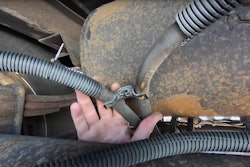
Ann Wilson, senior vice president of government affairs for MEMA, told the crowd at HDAW in Dallas recently that the time was right for finally passing a federal Right to Repair bill.
She meant it. The bill, H.R. 906, was introduced Feb. 9. It is sponsored by Rep. Neal Dunn, R-Florida. As of June 1, it has more than 25 cosponors in the House from both parties.
“The time for this is now,” Wilson says. “We’ve got to have those trucks on the road for the economic health of the United States.”
[UPDATE: MEMA offers insights on debt ceiling, Repair Act]
As Americans learned during the COVID-19 pandemic, rolling trucks mean goods on shelves, both in stories and in homes.
Collin Shaw, MEMA’s chief commercial vehicle officer, says there aren’t enough dealerships in the country to do the service for every truck responsible for moving that freight. It’s critical to keep independent shops, suppliers and distributors open to keep trucks moving and safe.
“An independent aftermarket is a vibrant part of the industry that’s important to protect,” Shaw says.
The industry operates now under a memorandum of understanding, Wilson says.
Marc Karon, president of Total Truck Parts and member of CVSN board of directors, helped write that memorandum.
“Right to repair is about the conveyance of information from the vehicle to the scanner,” Karon told a roomful of HDAW attendees. “You may not think this impacts your business,” he said, but it does.
Karon talked to Wilson and Lisa Forshee, senior vice president of government affairs with the Auto Care Association at HDAW’s education session.
That MOU and the recent John Deere MOU do not cover telematics, Wilson and Forshee pointed out, nor do those MOUs cover any future developments in technology.
New trucks are increasingly complex, Shaw says. Looking toward the future, Shaw says, the industry will have more alternative power and even autonomous vehicles, all of which will have computers and software that the heavy-duty industry will need to access for service and repairs.
“We may have domains or zones or even a while computer with distributed software for components,” Shaw says. “It’s critical to cover those to make sure we’re not locked out.”
Forshee says it’s helpful to think about connecting to the Internet. Early home computers connected through cables; now computers and other electronics connect via Wi-Fi.
“Trucks are exactly the same, and that will be the truck of the future,” she says.
If the data is being blocked, technicians, shops and other businesses can’t get the information needed to repair, maintain and create parts.
“We want to keep that transmission path, that direct access to data, available to the industry,” Forshee says.
Newer trucks commonly visit shops just for warranty repairs and routine service, Shaw says. Independent shops can take care of these tasks and are great training grounds for technicians, and there’s a shortage of technicians in the heavy-duty industry.
New trucks also eventually become used trucks, which go into smaller fleets and to owner/operators, which are more likely to use independent shops and aftermarket parts.
“Most of the trucks out there on the road are small businesses,” he says.
In the past, Right to Repair has been fought on the state level. Massachusetts and Maine, for instance, both have state laws on the books. The Massachusetts resolution is tied up in litigation. And, in Maine, more than 70,000 signatures were submitted to ask for a state referendum on the issue.
Karon said CVSN is working with MEMA, ACA and other organizations on a response to the proposed federal legislation. Wilson says other consumer right-to-repair issues make members more inclined to listen to the heavy-duty industry’s issues.
“Repair acts for all consumer electronics are extremely important,” Wilson says, citing issues with consumer appliances, electronics and other goods. “These kinds of irritants are bubbling up at the federal level. Overall, the focus on repair access makes it more favorable.”
A federal law would be stronger than any state law or the MOU, and Wilson says it would cover privacy, cybersecurity and transportation issues across the board.
“If heavy-duty is not included now, it will be harder later,” she says.
She says the industry can get involved by hosting members of Congress at their businesses, and that, if needed, MEMA will even help with talking points and staffers.
“People forget that local businesspeople know their members of Congress,” Wilson says. She suggests inviting them into the shop or the warehouse for coffee, and having other people in the industry, such as owner/operators or dispatchers, there to talk to them about the importance of a healthy heavy-duty trucking industry.
“Everyone needs to put their shoulder to the wheel,” Wilson says. “The time for the aftermarket to stand up and be counted is now.”










